Faces of Olmstead
The personal stories of a few of the thousands of people whose lives have been improved by the Olmstead decision and the Department's Olmstead enforcement work.
Integrating Workers with Intellectual and Developmental Disabilities in Rhode Island
In June 2013, the Department reached an Interim Settlement Agreement with the State of Rhode Island and the City of Providence to provide relief to approximately 200 individuals with intellectual and developmental disabilities who received services from the segregated sheltered workshop and day activity service provider Training Through Placement, Inc., and the Harold A. Birch Vocational Program, a special education program which operated a segregated sheltered workshop inside a Providence high school. Under the agreement individuals will receive access to integrated supported employment and integrated day activity services, allowing them to become more active participants in the community. Here are the stories of a few individuals who have already benefited from the agreement.
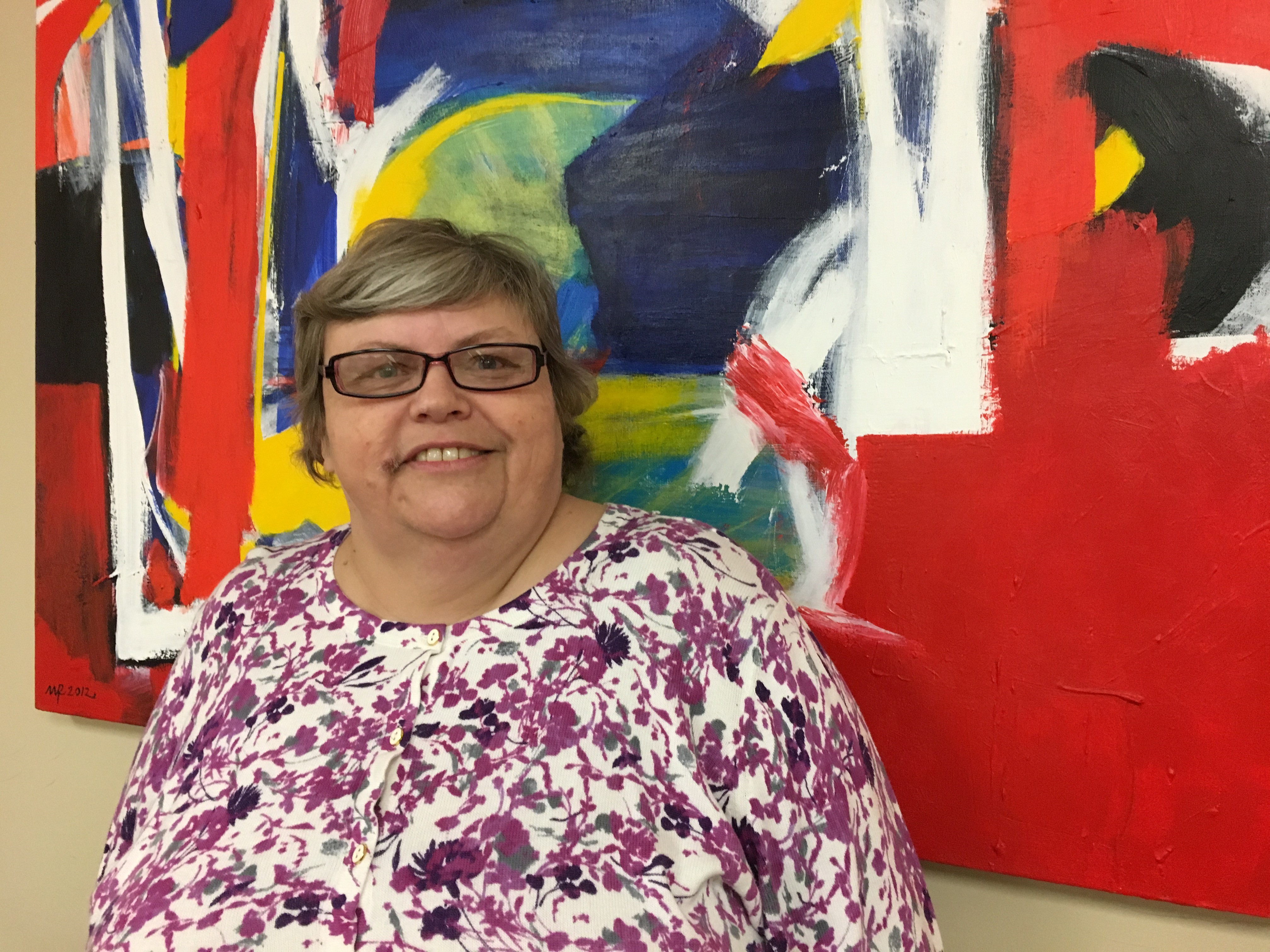
MARILYN LIMA
While attending William M. Davies Career and Technical High School, Marilyn Lima took cooking classes and discovered that she loved working with food. But instead of getting a culinary job after graduating in 1984, Marilyn worked in a segregated facility performing rote tasks, like collating papers and cutting wires, and interacted primarily with other people with disabilities. "She was bored," says Marilyn's employment services provider at the Arc of Blackstone Valley. Although she dreamed of a different career, Marilyn was stuck in the sheltered workshop for over twenty years.
After the U.S. Department of Justice and State of Rhode Island signed the Consent Decree in 2014, Marilyn finally received integrated employment services, aligned with her career dreams, from the Arc of Blackstone Valley. She received food service training at Cookie Place and obtained a food service certification. Just a few months later, Marilyn landed a job at Grandview Center in Cumberland, working as a dietary aid in the dining room of the nursing home.
"I serve people," says Marilyn. "I read about what they are allergic to and what types of meals they get. I set up 72 trays every day, wash dishes, serve residents, and clean the dining room." Marilyn works a minimum of 12 to 15 hours each week. When Marilyn first began working at Grandview Center, the Arc provided her with on-the-job coaching. Over time, Marilyn became more independent, and the job coaching support tapered off. "She's very good at what she does," says Marilyn's supervisor at Grandview Center. "She comes in, talks to the residents, and communicates with the cook who is on duty. She's good with the staff, and she picks up hours and says yes to anything I ask her to do. We all love Marilyn."
Having a job has increased Marilyn's independence. Marilyn lives in her own apartment, and spends her paycheck the way she wants. She bought a new loveseat and chair for her home and bakes for her parents and friends. Some of their favorite dishes include Marilyn's chocolate chip cookies and her orange cake.
Marilyn loves everything about her job at Grandview Center, especially the people. "My boss is super. She's even given me a couple raises!" Marilyn has also connected with her coworkers. She recounts the story of a day when a big snowstorm hit Rhode Island, and her regular transportation could not get her to work. "I called my coworkers and said, 'I can't come to work, I've got no ride.' They said, 'Don't worry, we'll pick you up!'" Marilyn also participates in work social events. "Marilyn is going with her coworkers to the Emerald Mall for a holiday party next week," said Marilyn's mother. Marilyn's mother is pleased that Marilyn is working at an integrated job in the community. "It has been a very good transition for her. It has helped her to be independent."
Marilyn has advice for other people in day services who are thinking about integrated employment: "Go for it! I was a little nervous at first, but you get comfortable after a while." Marilyn celebrated four years in her job at Grandview Center in December 2019 and recently received a raise.
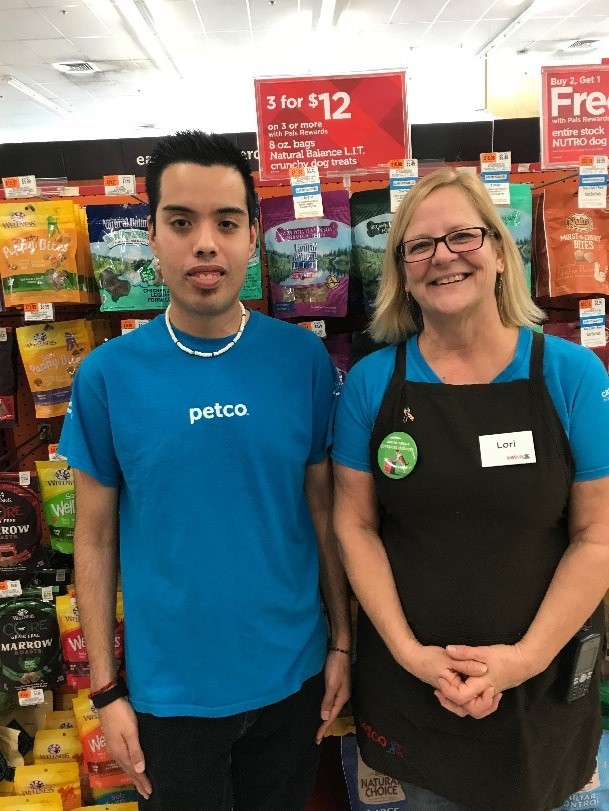
GENARO VAZQUEZ
Genaro Vazquez, Jr. attended the Harold V. Birch Vocational Academy, a special education program housed in Mount Pleasant High School, in Providence, Rhode Island. Genaro exited Birch in June 2014. Prior to the 2013 settlement agreement between the United States, the State of Rhode Island, and the City of Providence, students with disabilities at Birch were separated from their non-disabled peers. Instead of receiving academic instruction, these students, including Genaro, spent most days sorting, assembling, and packaging items at an in-school sheltered workshop. The students earned between 50 cents and $2 per hour for their work in preparation for similarly segregated, sub-minimum wage jobs in a nearby adult sheltered workshop.
The settlement agreement ended the sheltered workshop pipeline between the school and the adult workshop. As a result of the agreement, Providence integrated Birch students like Genaro into Mount Pleasant High School, where they learned alongside their non-disabled peers. In addition, Genaro began receiving transition services from Perspectives Rhode Island to help with him transition from school to work. His transition included volunteer rotations at a nursing home and a café, where Genaro learned what types of jobs he did and did not enjoy. "I did not like those jobs because the space was too small for me," says Genaro. Then, Genaro began to volunteer at Petco in Attleboro, Massachusetts, which he enjoyed. "My favorite part is seeing all the dogs," says Genaro. "I am getting my own service dog soon."
After seven months, Petco hired Genaro. Genaro is responsible for restocking food and litter and helps customers on the sales floor. Genaro's supervisor says Genaro is a hard worker. "He's very self-motivated, and he knows exactly how to do his job. He doesn't have to come ask me what to do next," she says. Genaro helps teach other Petco volunteers and has even taught his job coach how things run at Petco. When his schedule permits, Genaro keeps abreast of store policies and product information through online trainings. Genaro not only excels at his job, he's modest, too. When his supervisor says "Genaro is leader," he responds, "I wouldn't say I'm a leader. I just like to help people." Outside of work, Genaro is working on joining PAL (Partnership for Adult Learning) at Brown University.
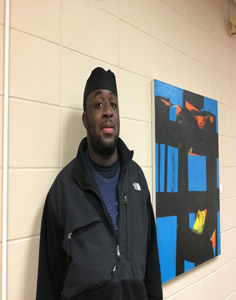
MOUSSA CAMARA
Moussa Camara graduated from William E. Tolman High School in Pawtucket, Rhode Island in 2012. After graduation, Moussa attended various day programs for individuals with disabilities. He quickly learned that attending a day program did not fit with his life goals. Moussa and his father agreed that his goal as an adult should be to work. In the wake of the Consent Decree signing in 2014, the Arc of Blackstone Valley's supported employment program helped Moussa achieve his employment goal. After a year of training in the Arc's café, Moussa gained the skills he needed to land a competitive job in the food service industry. "That is what I wanted to do, that was my goal," says Moussa.
In October 2017, Moussa was hired by Snapchef, a company that places individual food service workers in various settings as they are needed. Moussa was usually called in to work in the cafeteria at Salve Regina University in Newport, where he washed dishes and occasionally served food to students. Moussa is highly independent; he used Rhode Island's RIde program to get to and from work, received his work schedule on his cell phone, and performed his job with minimal assistance by phone from the Arc.
Recently, Moussa started a new job with Aramark Food Services. At this job, Moussa works in various school cafeterias. This job aligns with Moussa's career goals to work more hours and have a regular schedule. Additionally, Moussa is able to work around kids, which he enjoys. Moussa works 5 days per week. The Arc of Blackstone Valley provided Moussa job coaching to assist with the transition to this new job, helping him adapt to a new work environment with new people. Moussa is very happy with his job and his employer is very pleased with his work.
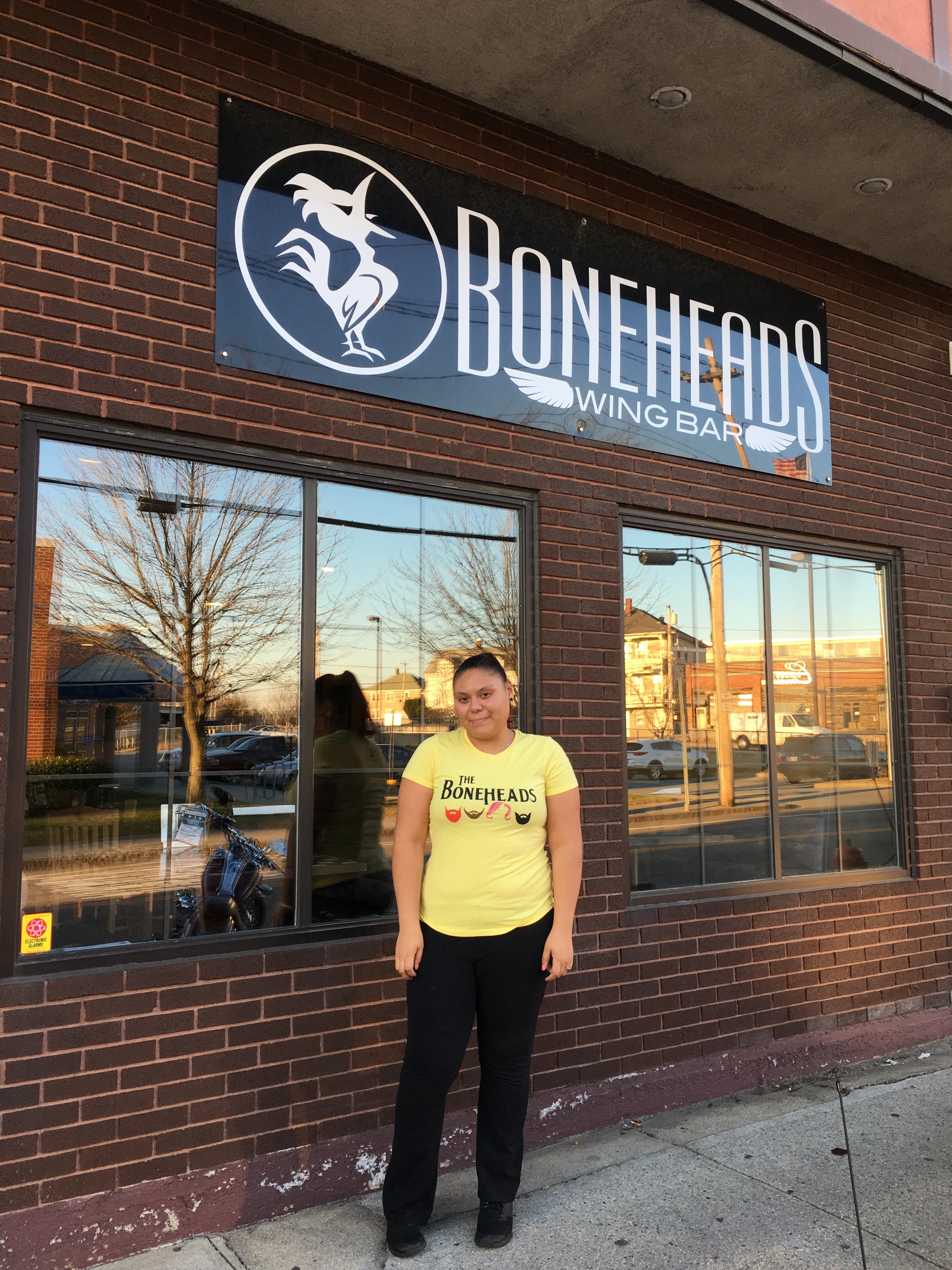
MARIXA LOPEZ
Before the 2013 settlement agreement between the United States, the State of Rhode Island, and the City of Providence, Marixa was a student at the Birch Vocational Academy, where students with disabilities participated in an in-school sheltered workshop. From 2011 to 2014, she participated in a transition program from the age of 18 to 21, performing different job assessments and learning workplace skills. Marixa knew she wanted to be working. "I love to work," she states. Marixa applied for her first job at Boneheads with assistance from a staff person at Perspectives who knew the manager. Marixa started work in April 2016. A job coach supported Marixa in her job at first, but as Marixa gained the skills and confidence she needed to work independently, coaching faded away. Today, Marixa works completely independently.
In October of 2018, Marixa started a new job at the Hilton Garden Inn. She loves her new job, where she works up to four full days per week in housekeeping and as a lobby attendant. Her job duties include cleaning the lobby and bathrooms, vacuuming, and sending laundry down the laundry chute. Initially, Marixa used public transit and the RIde program to get to work, but now she uses Uber and other ridesharing apps.
Marixa currently lives with her brother, but has plans to move to her own apartment with her fiancé. Marixa is planning her wedding and recently bought her wedding dress.
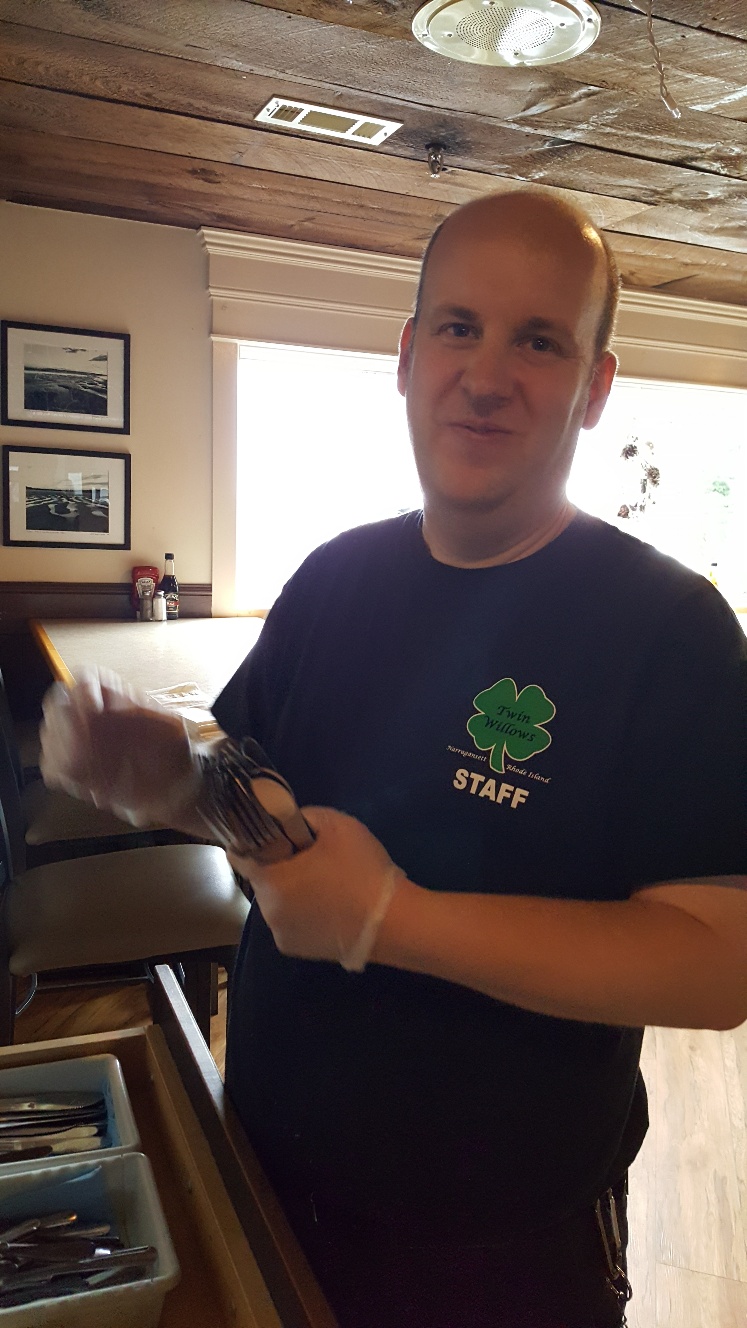
ED MCLAUGHLIN
When Ed McLaughlin's family moved home to Rhode Island in 2008, their goal was to find a good day program for Ed. Ed enrolled in a day program for people with disabilities in South Kingston, where he participated in activities such as bowling, swimming, and visiting the mall. After a few years, Ed befriended a local firefighter and began working at the fire station, cleaning the floors and the firetrucks. Ed now works at the fire station every Monday in addition to his other two jobs: one at Twin Willows, a waterfront seafood restaurant in Narragansett and another at the Boss Ice Arena at the University of Rhode Island. He also helps with his brother's business, a food truck called "Eddie's BBQ," named after Ed. Ed enjoys being around people and loves the variety of his work.
Ed has been so successful in finding work in part because of the employment services he has received from an agency called Perspectives. Ed began receiving supported employment services from Perspectives in 2013, which prepared him for his job at Twin Willows, where he now works each fall. Ed's parents helped him to apply for a job as a busser after eating at Twin Willows as a family. They knew that working was important to Ed, and they are proud that he is a part of his community and local workforce. At Twin Willows, Ed sets the tables, wipes them down, and sweeps outside. "Ed calls every afternoon, wanting to talk about what he did at Twin Willows," says his father. "He is super happy." Sitting beside his father, Ed grinned from ear to ear at his paycheck, tucking it carefully into his pocket.
Perspectives job coaches helped Ed achieve his goal of starting a new job at the Boss Ice Arena where he loves working near the Zamboni. At Boss Ice Arena, Ed works on the janitorial team. Working has been very satisfying for Ed. He balances all three of his jobs, and still has time to spend with his friends walking on the beach, playing soccer and spending time at the library. Ed chooses to spend some of his paycheck on traveling. He recently traveled with his mother to Jackson, Mississippi to attend a conference about employment where they had the opportunity to speak to a congressional committee and attend meetings.
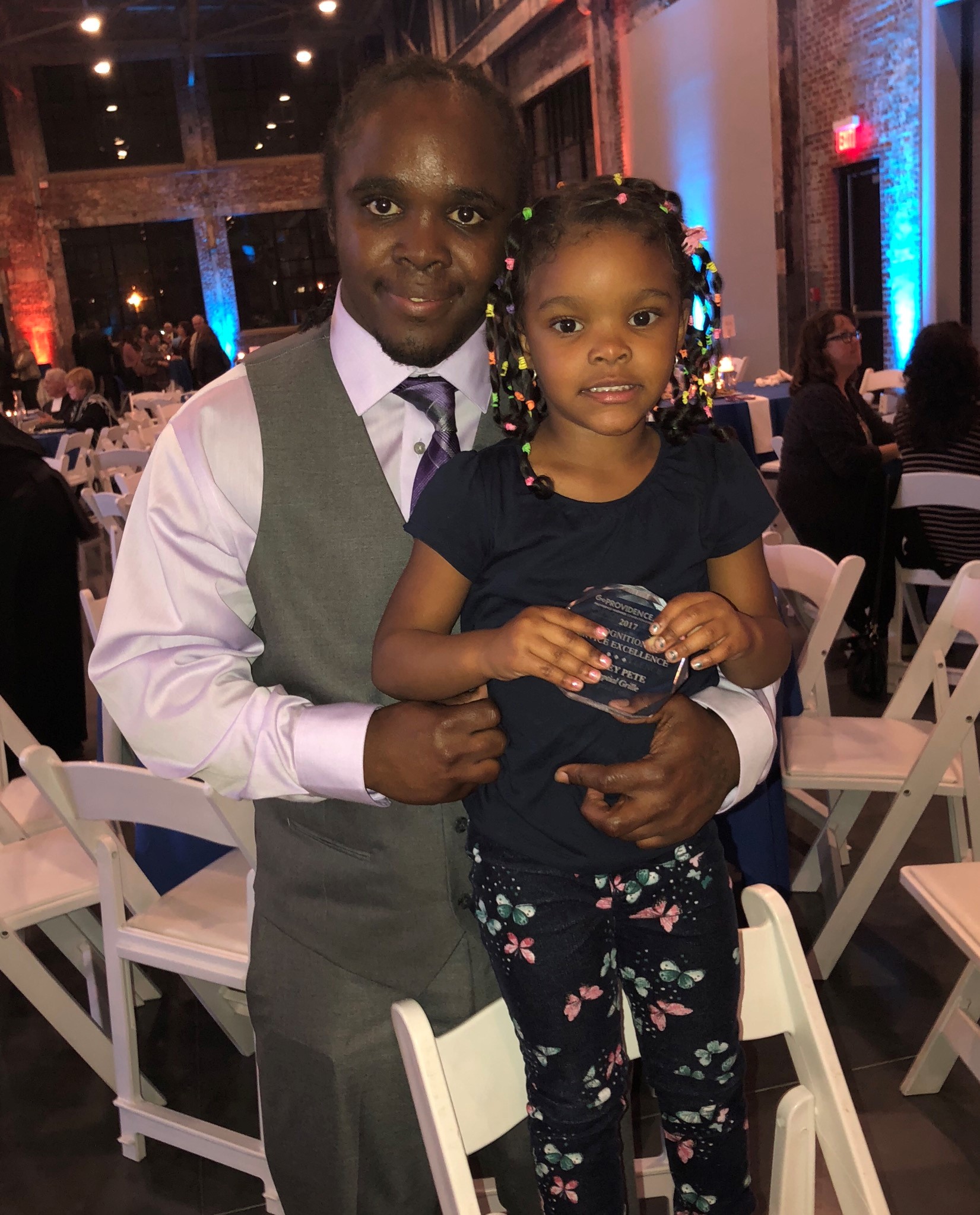
JEFFREY PETE
Jeffrey Pete has been working at the Capital Grille in Providence, Rhode Island for six years. Jeffrey was a student at the Birch Vocational Academy, where students with disabilities participated in an in-school sheltered workshop until the 2013 settlement agreement. After leaving school, Jeffrey received employment services through Community Work Services (CWS). A job opportunity presented itself when Darden Restaurants, the parent company of Capital Grille, decided to team up with FedCap Rehabilitation Services to hire an employee with disabilities. "At first we were unsure about how we were going to proceed," says Jeffrey's manager. "We did not have a specific job outlined for Jeffrey. But as I thought about it, I realized there were a number of tasks that were not being completed by our staff because they were not in anyone's job description." Jeffrey's manager and his team put those tasks together to create a job that filled a need at the restaurant and that was perfect for Jeffrey.
After brief assistance from a job coach, Jeffrey was able to do his job at the Capital Grille independently. Over time, the restaurant increased Jeffrey's hours and trained him to complete new tasks. Recently, Jeffrey received a promotion to join the food line. He also received a significant raise for this transition. In his new role, Jeffrey helps prepare the food, re-stocks materials and assists the chef. Jeffrey says that the chef has high expectations and pushes him to excel and be the best worker he can. Both Jeffrey and his manager point to communication as the key to Jeffrey's success. Jeffrey said that he really likes working with his manager, who communicates expectations and motivates Jeffrey to come to work and give it his best. "Once Jeffrey understood what I wanted from him," says Jeffrey's manager, "his performance got better and better. As we worked with him, he developed new skillsets."
Jeffrey is proud of his work. He is always on time and loves wearing merchandise with the restaurant's logo. Jeffrey's coworkers enjoy having him in the restaurant, too. "I didn't know how my staff would relate to having a person with a disability doing part of their job," states Jeffrey's manager. "I wasn't sure if they would buy into it. It turned out to be the opposite! The other employees enjoy having Jeffrey around and coaching him." Jeffrey said he was nervous at first about how coworkers would treat him but says he had no trouble bonding over their shared love of sports. Jeffrey has advice for anyone with a disability who is nervous about starting a new job: "Try it, you might like it."
Jeffrey prefers his work at the Capital Grille to the piece work he was doing in the sheltered workshop at Birch because he is able to meet more people. "My favorite part of my job is the people," says Jeffrey. Jeffrey says he knows his coworkers count on him. "Now, his disability is not his defining feature," says Jeffrey's manager. "He knows he is an important member of society. His perception of himself has changed." Jeffrey has come so far since working at Birch, "he proved everyone wrong", says Jeffrey's employment services provider. When working at Birch, he had no hope for the future. Now, Jeffrey is thriving, he budgets, pays bills, participates in sports and lives independently.
Jeffrey uses his paychecks to help take care of his daughter, who lives with her grandmother. "I am proud of being a good dad, of being there when my kid needs me," Jeffrey says. "My dream for [my daughter] is that she finishes college." To make this dream a reality, Jeffrey hopes to set up a college fund for his daughter. Additionally, Jeffrey has been working on his reading skills, so that he can read to his daughter. In the coming years, Jeffrey has set many exciting goals. He hopes to buy a house with his friends, and is currently studying to get his driver's license.
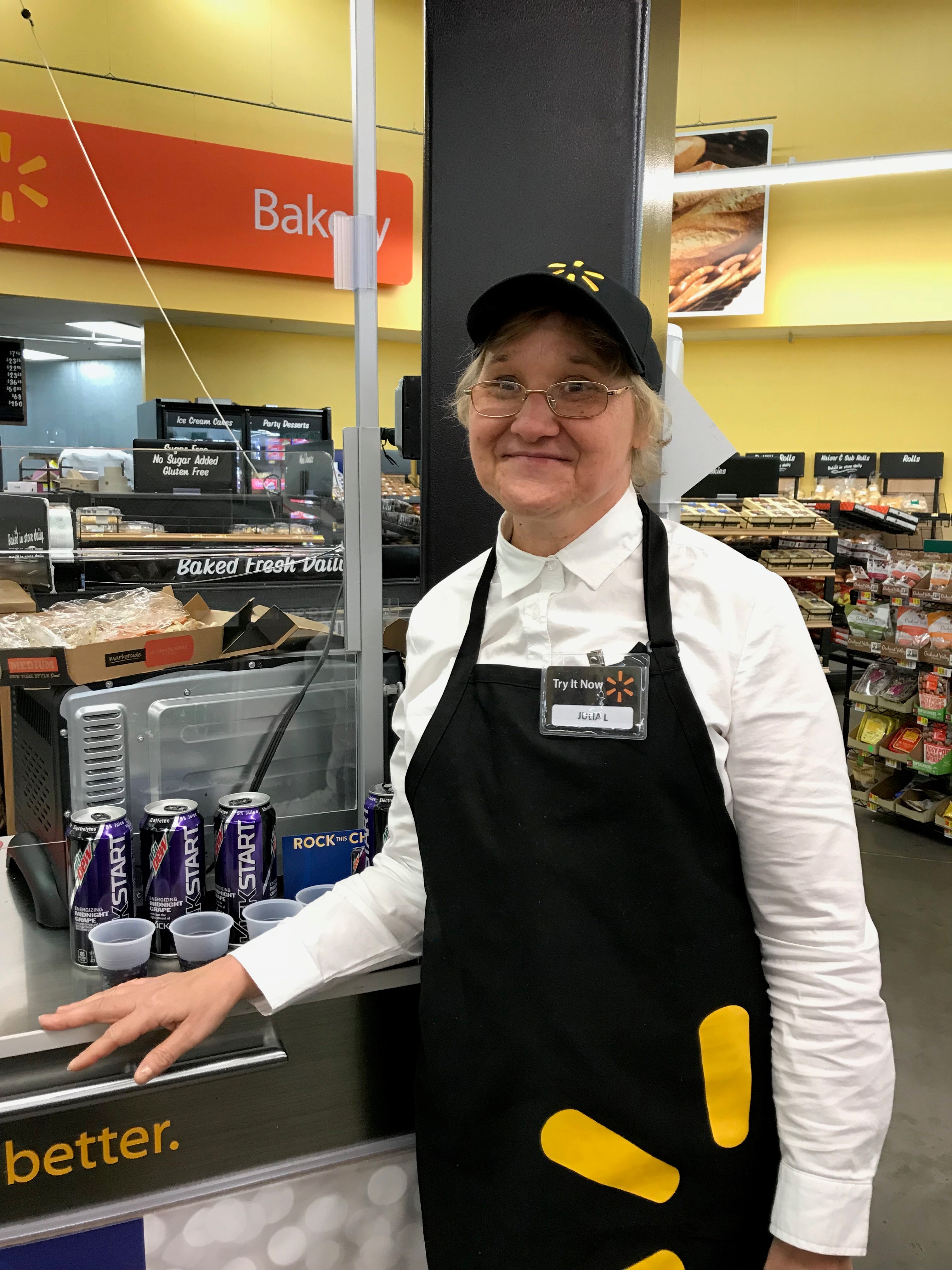
JULIA LOTTINVILLE
Julia Lottinville spent over 20 years participating in day programs and working in enclaves, interacting only with other people with disabilities and performing monotonous tasks like wire cutting, collating papers, and assembling boxes. After receiving supported employment services to help her prepare for a job, in October 2017, Julia began working for Advantage Solutions, a company that partners with retail chains for in-store demonstrations of products. Julia uses an app on her cell phone to learn about new products and then sets up displays in stores, such as Wal-Mart, where she hands out samples or demonstrates how a product works.
"I really love it," says Julia, who works two or three 6-hour shifts each week. "I love interacting with people. I like to help customers." Comparing her current job to what she used to do in the enclave work environment, Julia says her new job feels different. "I have more responsibility now. It's awesome." Julia's family has seen the impact of the job as well. "She's doing really fantastic, she's happy," says Julia's sister. "All she talks about is her job. She'll call me up and say, 'Sis, guess what, I made good money today!' I'm very happy that she's doing something she really likes." With her hard-earned money, Julia recently purchased her own cell phone.
"If you asked me two years ago if Julia could work, I would say no," says Julia's employment services provider at the Arc of Blackstone Valley, where Julia now receives supported employment services. "Because Julia is now getting the services she needs, she is able to work in the community. She's a more mature person today than she was when she was in day services."
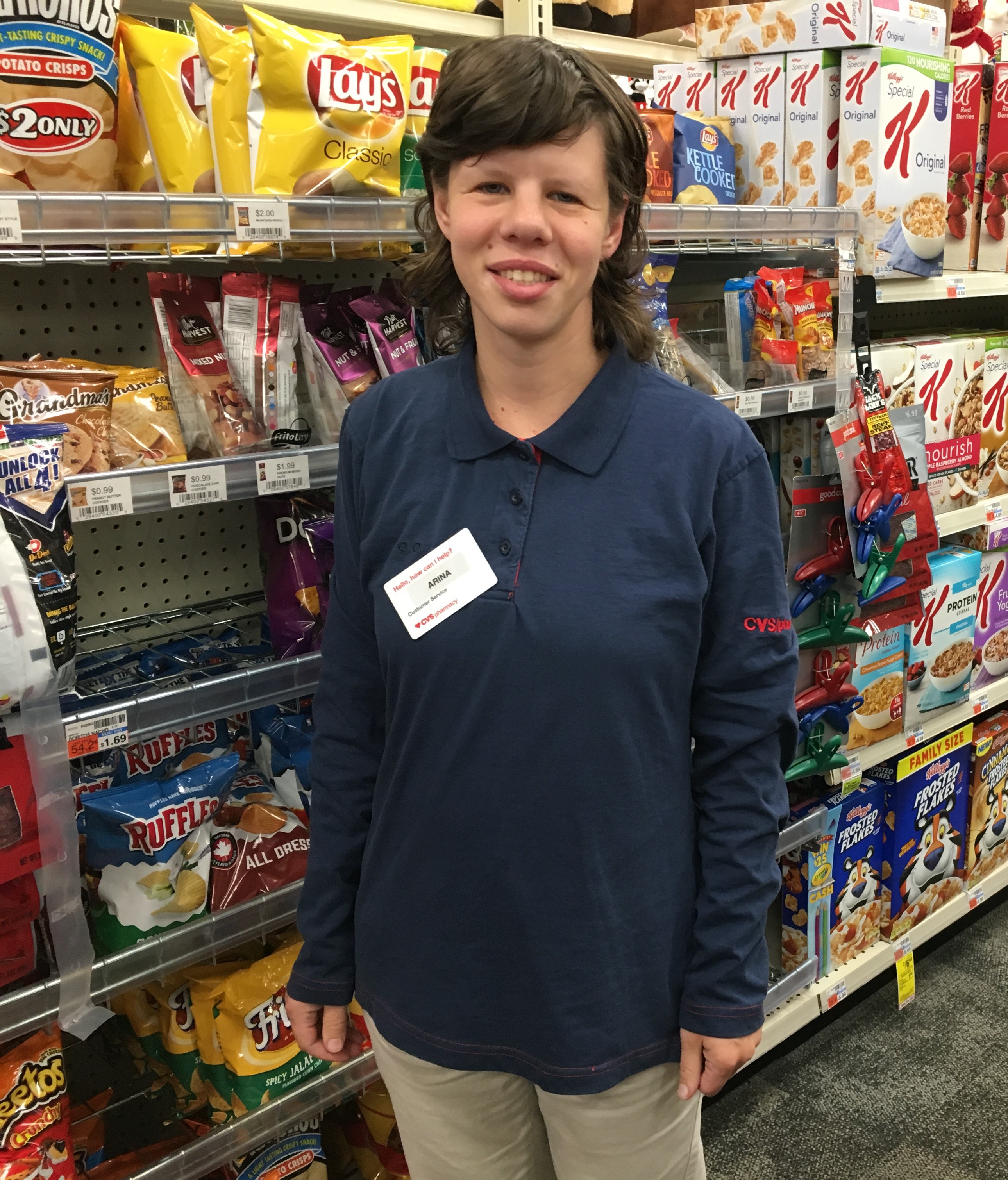
ARINA KALININ
Arina worked in a sheltered workshop, assembling and packaging hot water bottles, from 2011¬ until 2014. After receiving employment services through AccessPoint RI, Arina completed a workplace assessment at her local CVS store and in 2014, was hired as a sales associate. When Arina first started working, her job coaches helped teach her things like making eye contact and conversational techniques. Now, Arina works independently without any help from a job coach. She works at least two days per week and sometimes more depending on the time of year and the store's needs.
"I put on security tags, put away products, and remove out-of-date products from the shelves," says Arina. Arina primarily works in the food and candy aisles. The more Arina works in a particular aisle, the more familiar and efficient she becomes. "I like this work better than my previous work, because I have friends here." Arina says she uses her paycheck from CVS to go shopping at the mall, where she likes to shop for shoes. In her spare time, Arina enjoys horseback riding.
Arina's manager says there is no cookie-cutter way to treat employees, regardless of whether they have a disability. She says that he key is to find the right person for the right job. Arina brings a positive energy to CVS, and her coworkers enjoy her company. "She's a fabulous person, a hard worker, and she's very dedicated to everything she does. I hate even saying she's a person with a disability, because she's just like any other person," says Arina's manager.
CVS is working hard to increase integrated job positions for people with disabilities. A lead manager at CVS Health Workforce Initiatives says that CVS partners with community-based organizations like Arina's service provider, AccessPoint RI. Arina did a workplace assessment over the course of a few months, where she demonstrated her skills and considered whether it was the right job for her.
But, the lead manager says, Arina's story is just one of the ways CVS is working with community partners. CVS also has broader training programs, like its pharmacy technician training program in Boston. Through this program, CVS has trained about 100 individuals with disabilities to be pharmacy technicians and hired 72 of the 100. Other retail pharmacies or hospitals hired the remaining trainees. "I've seen that any individual with a disability deserves a chance to have competitive employment and earn a competitive wage," says the lead manager. "We can all be part of the solution to end sheltered workshops and get people access to competitive employment."
The lead manager also highlights the value individuals with disabilities bring to the workplace. "They are more loyal, reliable, and engaged, and in a lot of cases they drive loyalty. We know if we bring someone with a disability on-board, in a retail environment where turnover is off the charts, we see retention and loyalty increase. When turnover is lower, cost is lowered, and the cost of training is saved. There is also a tax credit available if employing these individuals takes them off of disability insurance. Seeing that CVS employs people with disabilities drives brand loyalty from families that have members with disabilities or care about the disabled community."
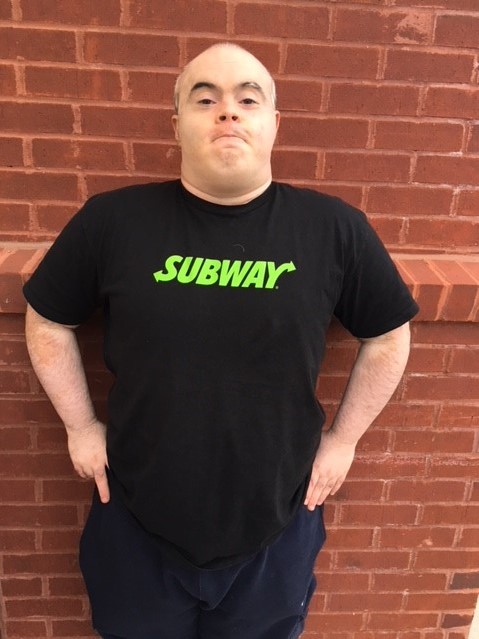
CHRISTOPHER PERRY
After graduating from high school, Christopher Perry worked in a sheltered workshop for about ten years. Following the signing of the Consent Decree, Chris began to receive employment services from AccessPoint RI. Chris had a few work trials at a Stop-and-Shop and a Better Shred, but Chris was still looking to find the right job. Then, in 2016, Chris was hired to work at a Subway in Cranston.
At Subway, Chris stocks the shelves with chips, soda, water, and juices sorting and organizing them for display. "Chris gets along really well and is good at taking direction," says Chris' manager and the owner of the Subway where Chris works. "Chris constantly wants to do more." AccessPoint RI is hoping to increase Chris' hours, possibly having him add hours working at a second Subway location.
"I like it," says Chris about his job. "I like my coworkers. It is different working at Subway than it was in the workshop. I like working at Subway more."
In his free time, Chris loves to participate in sports. He participates in the Special Olympics as a powerlifter. Chris says his dream job would be working in sports at a place like the YMCA.

EMILY MACLAUGHLIN
After graduating from West Warwick High School in 2010, Emily enrolled in the Rhode Island Transition Academy where she participated in several work trials including at a child care center, a clothing store, and a nursery greenhouse.
Since the Consent Decree was signed between the U.S. Department of Justice and the State of Rhode Island, Emily has worked with a supported employment services provider to identify job opportunities that correspond to her passions and interests. Emily has said she loves working with kids, and her dream is to work with children who have special needs.
For the past three years, Emily—also known as “Emily Red Sox” due to her love of sports—has worked in a competitive, integrated job as a bus monitor. “I love my job,” Emily says, further adding that her mother is proud of her for working. Emily’s mother gave her rides to and from work when she first started the job in Johnston. After a year, she applied for a position as a bus monitor in West Warwick closer to her home. Emily’s provider helped her find the West Warwick position, and provided her with interview preparation and job coaching services. At the interview, Emily received a job offer on the spot.
Emily has excelled at her job. Her duties include conducting a safety check for the bus driver, making sure it is safe for children to cross the road, and checking for sleeping children inside the bus at the end of a ride. Last Christmas, Emily received the Highest Achievement in Employment award for her work as a bus monitor. When asked why she works as a bus monitor, Emily noted the value of building experience and having money in her pocket, but she also said that what she likes most about her job is “the kids who love me to death.” Emily said that children cried on the last day of school because they would miss her during the summer.
Sue, Emily’s vocational specialist, has facilitated Emily’s transition to the community. Sue describes Emily as a peer mentor and an advocate for people with disabilities. She observed that Emily has become more outspoken as she has engaged more with the community. Emily volunteers with Best Buddies, a peer mentoring program, and attended Johnson & Wales, a leadership training program to develop communication skills. In her free time, Emily enjoys visiting Six Flags and participating in track and field events. Emily is also a member of a local softball team, and recently won tickets to Fenway Park through her participation in Special Olympics.

GIO MAZARIEGOS
Gio graduated from the Harold V. Birch Vocational Academy in 2014. Birch is a Providence high school where students with disabilities participated in an in-school sheltered workshop until a 2013 settlement agreement between the United States, the State of Rhode Island, and the City of Providence. Prior to the agreement, students with intellectual and developmental disabilities at Birch were separated from their non-disabled peers. Instead of going to school these students spent most days sorting, assembling, and packaging items. The students earned between 50 cents and $2 per hour for their work in preparation for similarly segregated, sub-minimum wage jobs in a nearby adult sheltered workshop. The settlement agreement ended the sheltered workshop pipeline between the school and the adult workshop.
As a result of the agreement, Rhode Island now provides employment and day services for adults and students with intellectual and developmental disabilities and prepares them for employment in the community. These employment services helped Gio leave a segregated setting and find an internship and then a job at Elmwood Health Center.
Gio has been working at Elmwood Health Center two days a week, earning minimum wage, for the past two years. His duties include getting meals from the kitchen, serving them to residents, cleaning, and socializing with residents. Gio excels at his job and has forged strong bonds with his coworkers, saying that he “loves” them. Gio is so reliable that his co-workers worry when he does not show up to work. The Elmwood staff trust him to complete his assigned tasks and responsibilities without supervision. Gio now needs only occasional check-ins by his job coach while at work. With the help of his job coach, Gio is learning to ride the bus to work independently.
Gio’s competitive income has afforded him new financial freedoms. Recently, Gio paid $40 to take his mother to see a Guns N’ Roses concert. When asked about his ultimate aspiration, Gio states that it would be to save up enough money to live on his own. When he is not working, Gio receives non-work related day services from his provider and participates in activities such as basketball, bowling, and travel training. He also visits his friends from Birch. Gio enjoys going to the mall, watching films, and shopping at Walmart. He also has participated in various sports in the Special Olympics since he was eight years old, specifically soccer, basketball, track, and relay.

JOHN "JAY" WARBURTON
Jay attended the Harold V. Birch Vocational Academy, a Providence high school where students with intellectual disabilities participated in an in-school sheltered workshop. Birch is a Providence high school where students with disabilities participated in an in-school sheltered workshop until a 2013 settlement agreement between the United States, the State of Rhode Island, and the City of Providence. Prior to the agreement, students with intellectual and developmental disabilities at Birch were separated from their non-disabled peers. Instead of going to school these students spent most days sorting, assembling, and packaging items. The students earned between 50 cents and $2 per hour for their work in preparation for similarly segregated, sub-minimum wage jobs in a nearby adult sheltered workshop. The settlement agreement ended the sheltered workshop pipeline between the school and the adult workshop.
After graduating from Birch in 1990, Jay transitioned to a Rhode Island sheltered workshop in 1991 where he did workshop tasks like assembly and cleaning work for subminimum wage. Jay was at the sheltered workshop for 23 years. Through the workshop’s vocational program Jay received community job trials at the Newport Creamery in Wakefield, and Crazy Burger in Narragansett, however they were short lived. John says, “I didn’t want to stay there forever. You’ve got to move on. They didn’t help me and it wasn’t the place for me.”
Since the Consent Decree was signed between the U.S. Department of Justice and the State of Rhode Island , the sheltered workshop where Jay worked was taken over by a provider of supported employment services ; Jay has worked as part of the new supported employment provider’s landscaping crew, nicknamed the “Green Team.” Jay was a member of the Green Team for about six months starting in April 2015. “I loved it,” Jay says of his position, “It was fun.” Since March 2016, Jay has been working in competitive, integrated employment at Walmart in North Kingstown, RI. “I never want to give it up,” Jay says. His duties include collecting carts from the parking lot, lining them up, and pushing the carts into the garage. Jay works three to four days a week, for five to seven hours each day. Provider staff drive Jay to and from work, with a staff member occasionally staying at the job site with Jay to provide support when necessary. Other times, Jay works independently.
Matt Greco, Jay’s job coach, helped Jay locate Walmart’s job posting, apply for the position, and interview. In addition, provider staff helped Jay with his onboarding process at Walmart, where he completed video tutorials, filled out an online assessment, took a tour of Walmart, and met with the store managers. Jay now earns minimum wage.
Jay’s goals include making money to buy things and go on vacations. In his free time, Jay likes to spend time with his parents participating in various types of activities, including rafting, sailing, skiing, mountain climbing, going to the beach and attending hockey games. “It’s been a really good year for me,” Jay says, “I’ve learned a lot.”
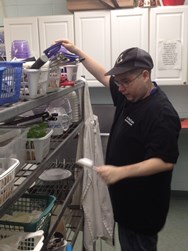
JERRY D'AGOSTINO
Jerry graduated from the Harold V. Birch Vocational Academy in 2010. Birch is a Providence high school where students with intellectual disabilities participated in an in-school sheltered workshop, separated from their non-disabled peers. At Birch, Jerry earned well below minimum wage for rote tasks such as sorting, assembling, and packaging jewelry and buttons. After graduation he continued this “benchwork” for Goodwill Industries, a local sheltered workshop for adults. Jerry did not enjoy the work because “it was boring” and he had “too much down-time.” Jerry states, “I thought I would be doing benchwork my whole life.”
Jerry’s provider began phasing out benchwork after a 2014 Consent Decree between the U.S. Department of Justice and the State of Rhode Island. Jerry was eager to look for competitive work. At the time he thought, “benchwork was all I had going for me.” Provider staff assisted Jerry in identifying job opportunities in the community to match Jerry’s passion for cooking shows like “Hell’s Kitchen.” After his job coach helped Jerry secure a work trial at West Wing Café, Jerry landed a job providing food service at a daycare. Jerry now works two days a week as an assistant chef at Dr. Daycare. To prepare for the responsibilities of this position, Jerry took part in a six-week training course and received his food handling certificate after learning about food safety and meal preparation.
Jerry’s duties include setting up for lunch, doing dishes, and making sure the station is clean. To get to and from work, he independently rides the bus. Jerry is glad to have not “touched a single piece of benchwork” since moving into integrated employment.
Jerry has excelled in his job and was recently promoted to work five days a week. He likes being an assistant chef, respects his co-workers, and is paid minimum wage. The head chef, Peter, trusts Jerry. Peter recently had to take the day off, and left Jerry in charge of the kitchen. Jerry made all the lunches without assistance and was still able to take his break.
Jerry now uses his work experience to cook his own meals at home. With his greater independence and earnings, Jerry is able to attend events that interest him such as wrestling, movies, and Comic Cons. Cathy, Jerry’s job developer, states that in his new job, Jerry is happier, more confident, and adds a “new perspective” as an advocate for individuals with disabilities. Jerry is involved in RIPTA Rider’s Alliance and speaks on problems people with disabilities face with transportation. Jerry is also a spokesperson for integrated employment and has given multiple presentations to individuals with disabilities and their families.
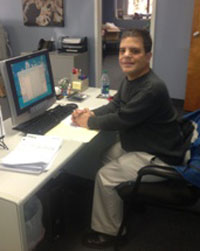
STEVEN
For the past thirty years Steven has done what millions of Americans do every day: he gets up early in the morning, goes to work, and earns a paycheck. The fact that Steven has an intellectual disability has never stopped him from seeking to earn a living. But, for most of Steven's life he has had little choice other than to work in a segregated sheltered workshop where he earned well below minimum wage and had little to no contact with non-disabled persons, other than supervising staff.
From 1983-2013, Steven worked at the sheltered workshop and day program provider Training Through Placement, Inc. (TTP), located in a former school building in North Providence, Rhode Island. Steven was one of about 90 people with intellectual and developmental disabilities performing piecework at TTP. There, workers sat along cafeteria-style tables in old classrooms and breezeways, and were assigned tasks such as assembling, sorting, packing, and labeling various products like medical supplies and jewelry. Steven also worked on the facility's "Pandora's Products" line, stuffing peppers, grating cheese, and placing food products in jars.
When Steven first entered TTP, he thought it would be a short stay – just long enough to gain the skills necessary to secure long-term employment in the community. After all, as Steven points out, "the name of the provider is Training Thru Placement." Steven had previously worked in a hardware store after high school and wanted to gain additional skills before returning to the general workforce. But that didn't happen. Because of the lack of State-funded employment services and supports that would have made it possible for him to return to competitive employment, Steven was trapped at TTP for decades.
When he began working at TTP Steven earned approximately $2 an hour. Because TTP held a "special minimum wage" certificate, it was permitted to pay individuals with disabilities sub-minimum wages. These wage rates are based on workers' individual productivity as compared to that of experienced workers without disabilities performing the same work. In spite of his three decades of experience, however, Steven was never promoted and never received a meaningful raise in wage. Thirty years after he began working at TTP, Steven still earned the same wage of approximately $2 per hour—substantially below Rhode Island's minimum wage of $7.75.
Year after year, Steven asked for the services necessary to help him secure integrated employment. No effort was made to assist him in finding a job at a competitive wage that matched his strengths and interests.
All of that is now changing for Steven and the service recipients at TTP. Over the next year the State will provide supported employment services and placements to all people at TTP to help them find, get, keep, and succeed in real jobs. The services will be designed to help people access jobs in typical work settings where they can interact with non-disabled peers and earn at least minimum wage. And when individuals are not working, they will have access to integrated day services. Under the agreement negotiated with the state, individuals like Steven receive supported employment and integrated day services sufficient to support a normative 40 hour work week, with the expectation that individuals will work, on average, in supported employment for at least 20 hours per week.
As a result of the settlement agreement, Steven has finally fulfilled his thirty-year goal of community employment. Steven is flourishing in his new job at a local small business headquartered in Warwick, where he works at least twenty hours per week. He enjoys working in an office setting, and because of his effective self-advocacy, he persuaded his employer to provide him with computer training, which will allow him to expand his skill set and advance his career.
Thinking back on his time in the sheltered workshop, Steven noted, "we just did what we thought we were supposed to do, and while we believed that many of us could do more with our lives, we did not know how to make that happen." When asked what it means to Steven to realize his dream of working in the community, Steven responded, "it is a big achievement for me; I've been waiting a long time for this."
The President of the company, Alan, initially did not know what to expect from Steven, but quickly realized he had made a prudent investment: "When you hire someone with disabilities, you think you are helping them out, but no business owner can possibly imagine the benefits that they will receive in return." Reflecting on Steven's dedication, abilities, and successes thus far, Alan says, "I can't help but think if Steve had this opportunity twenty-five years ago, where he'd be today—we are very lucky to have Steve on board."
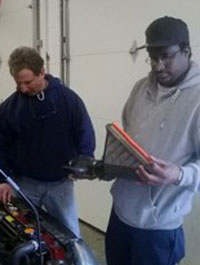
ORQUIDEO "Q"
After graduating from the Birch Vocational High School at the age of 21, Orquideo "Q" went straight into a sheltered workshop, where he earned $2.85 an hour performing piece rate work. He stayed there for eight years.
When the sheltered workshop closed this summer after a settlement agreement between the U.S. Department of Justice and the State of Rhode Island, the provider Fedcap began working with Q to identify job opportunities in competitive industry. Q shared that he had a passion for working with cars, which led to his current employment at a local auto-repair shop. Q now works in the community for at least thirty hours per week.
Q takes great pride in his work, including car details, oil changes, tire rotations, and worksite maintenance. He catches two buses and is the first to arrive at work every morning. His supervisor, Greg, describes Q's enthusiasm to learn and his willingness to try new things as some of his most valuable assets. After seeing Q work and interact with colleagues and customers, Greg strongly affirmed that there is "no question that Q should be working in the community" rather than a sheltered workshop—"he is a great employee and has continued to grow every single day."
Greg observed early on that he could supply valuable natural supports to Q to ensure his success on the job. To assist Q in making sure his tools were accounted for, Greg devised an easy labeling system for the tools. The system has been so successful that Greg has expanded it to all of his work stations and for all of his employees. Greg highlights this anecdote as just one example of the many benefits that Q has brought to his business.
Cheryl, Q's job coach through Fedcap, facilitated Q's transition into the general workforce. She observed that "community employment has given Q such a sense of pride and accomplishment that he didn't have in the sheltered workshop." Cheryl also notes that, because of the natural supports that have developed at the auto-repair shop, her role has already decreased dramatically and she rarely goes to the job site.
Q's competitive income has also afforded him new financial freedoms. With his first paycheck he bought a bed for his dog, which he had wanted to do for some time. And with his next paychecks, he plans to buy shoes and clothes for himself. But to Q, money is not the most important element—when asked what he loves most about his job, he says it's his coworkers: "They make me laugh a lot and they make me feel comfortable—they make me feel like I am a part of them."
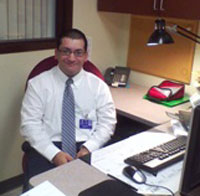
LOUIS
In 2008, Louis graduated high school with a diploma, but because of a developmental disability that restricts his verbal-motor functions, he was unable to secure long-term integrated employment. His mother Lori - a fierce and devoted advocate for her son—found in a sheltered workshop setting "a closed and protective environment" where Louis "would be among others with similar needs." Louis worked at the sheltered workshop Training Thru Placement (TTP) for two and a half years, earning well below minimum wage.
When the U.S. Department of Justice reached an agreement with the State of Rhode Island this past summer to transition sheltered workshop participants to integrated employment, Lori objected: "We were very happy with TTP because Louis had work, socialization, and the other clients looked up to him." After some persuasion, however, Fedcap—the agency responsible for transitioning the workshop participants—convinced Lori to explore the option of supported employment.
In October Louis started his new job at Eleanor Slater Hospital, a state hospital, where he utilizes his strong computer skills and passion for mathematics to generate Excel reports, record timesheets, and complete other office-related duties. Louis works at the hospital for forty hours per week. He drives himself to and from work and especially enjoys having his own office, which he has decorated with Red Sox paraphernalia. When asked about challenges that he has faced in his job, Louis jokingly admits that wearing a necktie every day is still somewhat of a struggle.
Seeing her son thrive in the mainstream workforce has dramatically changed Lori's perspective about supported employment. In fact, she recently joined Fedcap/TTP's Board to promote the efforts of community employment for individuals with disabilities.
Looking back Lori admits: "By trying to protect Louis, I was capping him." Lori says that in just a couple of months in his new job "Louis has come out of his shell and his confidence levels are through the roof." Lori was especially touched when, after the Red Sox won the World Series, Louis went out and surprised his father and uncle (also ardent baseball fans) with championship t-shirts that he purchased with his own money. Louis's job has forever changed the family dynamic and the course of his own life. Now, Lori says, "the sky is the limit."

PEDRO
The day after Pedro graduated high school in 2010, at age twenty-one, he found himself at home with no job prospects and no career direction. A native Spanish speaker with intellectual disabilities, Pedro was not prepared to enter the general workforce; instead, he was headed for a life of segregated employment and below-minimum wages in a "sheltered workshop." Sheltered workshops are places where people with disabilities spend the day typically doing repetitive manual work to fulfill contracts with private businesses. Workers in sheltered workshops generally have little or no contact with anyone without a disability and are often paid below the minimum wage.
Pedro attended a Providence high school where students with intellectual disabilities participated in an in-school sheltered workshop. In the workshop there were no students without disabilities. The students spent most of their school days sorting, assembling, and packaging items such as jewelry and pin-back buttons. They earned between 50 cents and $2 per hour for their work. Rather than receiving the education and services needed to help them move into regular jobs, students were being prepared for segregated, below-minimum wage work in adult sheltered workshops. Indeed, in 2013, the U.S. Department of Justice found that Pedro's school-based sheltered workshop was a direct pipeline to a nearby adult sheltered workshop.
After graduating from the school's sheltered workshop, Pedro began working at the adult sheltered workshop. Staff described him as an excellent worker who stays on task and performs well. But Pedro was paid just 48 cents an hour. And, because people who enter the adult workshop often stay there for decades and are rarely offered help to move into real jobs in the community, Pedro's career outlook was dim.
That all changed in June 2013 when the department reached an Interim Settlement Agreement requiring Rhode Island and Providence to provide employment services to help workers at the adult workshop and students at the school's sheltered workshop move into community jobs. At the same time, the school closed its sheltered workshop, so students with disabilities can focus on education and preparing for real jobs.
Pedro was interested in the restaurant industry, and in the summer of 2013 he joined a culinary arts training program. Twelve weeks later, helped by a combination of federal and state services, Pedro began working in the kitchen at a restaurant in North Kingstown. He has excelled and forged strong working relationships with other employees. He says he loves his job and especially enjoys preparing coleslaw for customers.
In December 2013, just three months after he started at the restaurant, Pedro was Employee of the Month. His manager said that Pedro was chosen for the award because "he has changed the culture of the company by inspiring everyone around him to reach higher; he has led by example." The company's owner describes Pedro as the heart of the business: "He has a great personality and loves working here – but more than just a personality, he does a great job."
Pedro started his job with a job coach, funded by the state and federal government, but because the restaurant was such a good job match for Pedro and natural supports developed quickly, Pedro no longer needs coaching service. In fact, Pedro is now helping the job coach train other employees with disabilities.
Pedro deeply values his job at the restaurant, where he gets to work with peers without disabilities, earn a competitive wage and benefits, and enjoy all the advantages of community employment. His supervisor says the company, too, has experienced major benefits. She describes the strong sense of pride that comes from hiring Pedro and giving him the opportunity to realize his capabilities and participate in the American workforce: "It's a very fulfilling experience to see Pedro mainstream himself, to show responsibility, and to see him getting an honest wage for his work." Pedro's life is on a new path – and for this young man, there's no looking back.
Improving the Lives of Individuals with Developmental Disabilities in Nebraska

SHAWN
At the time we began our investigation, Mary “Shawn” Hepburn lived in a very institutional building on the BSDC campus with a dozen other women. Shawn had limited communication skills and she was not very interested in any work-related activities. Shawn was denied meaningful opportunities to access the community; she was not considered capable of expressing or even having a preference as to how or where she lived. At the time, Shawn’s mother, Mary O’Shea, was a staunch supporter of institutionalization for people with DD. Indeed, her mother was the co-founder of the statewide Voice of the Retarded chapter, and was its chair for more than a decade. Prompted by our Settlement Agreement, the State took a multi-step approach to provide Shawn with more integrated services. Initially, the State convinced the mother to agree to community day services for Shawn. Shortly thereafter, the mother could see firsthand that Shawn was benefitting from the community interactions. Over time, the State persuaded the mother to agree to Shawn living in the community. Shawn now lives in an extended family home with a married couple and their children. Both Shawn and her mother developed a close relationship with the provider and their large extended family. Since moving to the community, Shawn’s vocabulary and communication skills have expanded considerably. She is comfortable letting people know what she wants; she has become the advocate for herself that her mother attempted to be for decades. Shawn participates in community volunteer and vocational activities most weekday mornings. She receives various clinical therapies most weekday afternoons. She goes shopping, participates in recreational activities with her family, and regularly attends church. She loves swimming and participating in aquatic therapy. Shawn now has a full life with many friends and people who truly know her and love her. She is no longer isolated. The mother’s transformation was complete; she went from community opponent to community advocate.

LIZ
When we began our investigation, Liz Nelson lived in a large institutional building on the BSDC campus with several other women with significant behavioral challenges. Liz too exhibited problem behaviors – typically about 90 different incidents per year, many of which resulted in injuries. She constantly swallowed small inedible objects, she fell repeatedly and she often tried to elope; she even carried mechanical restraints around in her own backpack, to make it easier for staff when they wanted to restrain her – which was often. Liz had limited community experiences. Her mother was opposed to community placement until her behaviors “improved.” Prompted by our Settlement Agreement, the State decided to provide her with a more meaningful day in integrated community settings whenever possible. Liz was very receptive to learning independent living skills in community settings. Because her life was increasingly filled with meaningful activities, Liz’s behaviors began to decrease and her team was able to start talks with her mother about alternatives to BSDC. In 2012, Liz moved to a companion home in Omaha. More recently, she moved home to live with her family. Liz has grown increasingly independent and has become quite social; she helps to prepare family meals, attends to her own household duties, and enjoys shopping, going to church, dining out, and participating in other community activities. Liz participates actively in a young adult group at her church and she has made many friends there. She volunteers at the local food bank and at a retirement center. For the first time in her life, Liz is a very happy person; not surprisingly, behavior incidents are now rare and minor.
Mental Health and Developmental Disabilities Services in Georgia
In October 2010, the United States settled its case against the State of Georgia, resolving claims that persons with mental illness or developmental disabilities were harmed by unnecessary confinement in State hospitals. The State agreed to create meaningful community services systems, including crisis services, case management, housing supports, and other services supporting full integration in daily life for persons with mental illness or developmental disabilities receiving State services. Here are stories of some of the people who have benefitted from the Georgia agreement.

MICHAEL
Michael spent years in and out of rehab and battling depression, eventually ending up in a halfway house where he constantly felt unsafe. Michael said he “never had any peace” and he “didn’t care if I died.”
In March, Michael met with a caseworker at a local supported employment program. His caseworker, Jody, helped Michael develop interview skills, work on his resume, and start applying for jobs. Soon after, Michael got a full time job working with inventory at a large corporation. He values knowing “when my next paycheck will be” and being able to provide for his own needs. Jody has stayed involved in Michael’s life, checking in on him at least once a week and going out of his way to help him out.
Michael also received a housing voucher which helped him to get his own apartment. Living near work has made it possible for him to keep his job. Beyond that, Michael has loved having his own home. He now has privacy, feels safe, and “I can sleep at night now.” When people ask where he lives, he said “I don’t feel embarrassed anymore.”
Community supports have given Michael some stability and with their help he has rebuilt a life for himself. His depression has improved since he now has a job and “a place to call my own.” Michael has a new sense of purpose and looks forward to each day, saying “I want to wake up every morning now.”

CINDY
A simple lunch date at a local restaurant was once unimaginable for Louise and her daughter, Cindy. But now that Cindy lives in a home a mere 20 minutes from her mother, the two have met for lunch weekly, accompanied by Cindy’s ever-present caregivers. One such meeting in late October 2012, when Cindy greeted her mother with a hug, was particularly meaningful for Louise. “Cindy had never done that before,” she said. “But since she’s been living nearby and I’m able to see her more, I now believe Cindy knows who I am.”
Cindy, who is 31, has severe developmental delays and needs assistance with many basic tasks. “You can’t ever leave her alone,” her mother said. “She doesn’t know to look both ways before stepping into the street. She doesn’t know to avoid touching a hot stove.”
For years, Louise and her husband, Ashley, had cared for their daughter at home, but by the time she was 16 her aggressive behavior had worsened, prompting her parents to place her in state care. Until last year, she was residing in Southwestern State Hospital in Thomasville, Georgia, 85 miles away from her parents’ home in Dawson.
In July of 2011, shortly before her father died, Cindy moved into her current home, which she shares with her caregivers and three roommates. Before the move, her parents had been nervous, fearing she would be subject to abuse in a smaller setting. But now Louise couldn’t be happier, and she is especially glad her husband lived long enough to see Cindy’s new surroundings.
“I just really feel like the Lord has been a part of this process,” she said. “It’s great having Cindy so much closer and being able to see her more often. But my biggest concern is her well-being, and I can see that she’s being taking care of. And she just seems really satisfied. That’s important to me.”
Mental Health Services in Delaware
In July 2011, the United States Department of Justice ("DOJ") signed an agreement with Delaware to transform that State's mental health system. The Agreement will help more than 3,000 individuals move into the community and out of Delaware's state operated psychiatric hospital and other state-funded psychiatric facilities or avoid having to enter these institutions to get needed services. Instead, the Agreement is aimed at providing individuals with mental disabilities those necessary supports and services to allow them to live and thrive in the community. Here are the stories of a few of the people who have already benefited from the Agreement.

MICHAEL
Michael, 21, has been hospitalized repeatedly and is now successfully working at the a corporate restaurant chain as a line cook. Michael is a graduate of a culinary program run by Connections, a provider of community mental health and substance abuse services licensed by the Delaware Division of Substance Abuse and Mental Health following the Settlement Agreement. Since October 2011, when the program was established, 90% of the enrollees have been able to obtain employment. Michael, when asked to describe his life now, responded: "I couldn't be any happier than I am now; don't ever see myself going back."

KNICOMA
Knicoma is an artist working with the Creative Vision Factory, in Wilmington, Delaware, an art center founded in 2011 to provide individuals with behavioral health disorders an opportunity for self-expression, empowerment, and recovery through its studio and exhibition program. Knicoma was recently selected as an emerging Delaware artist and given a grant through the National Endowment of the Arts. He specializes in drawings in a variety of media. His works confront the evils he sees lurking in today's world and offers a range of redemptive solutions and "ways out." Knicoma believes the messages informing his art assist others in their journey to self-awareness and enlightenment, "to help stop the things that happen over and over again in people's lives – to break the cycle." Knicoma has a strong belief in art's role as a means for social and personal change. "I paint from the experiences I've had." Although he has been hospitalized in psychiatric hospitals in the past, Knicoma now lives on his own. "The person that I am makes the pictures that I make." Asked how the Settlement Agreement affected him, Knicoma responded "Matter of respecting somebody – respect is letting others know that you honor him as a human being."

JAMES
James, a 48-year-old man, is a recovering drug addict who has depression. He now works as a para-transit driver and as a licensed barber. James provides free haircuts at a local community peer center for individuals who are in recovery. When asked why he provides these services, James answered that "I enjoy helping people and giving back."
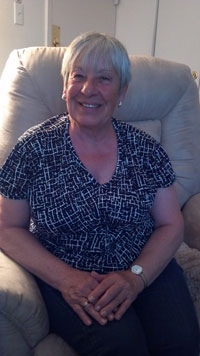
ROSE
Rose is a 65-year-old woman who was formerly homeless. She spent two and a half years at the Delaware Psychiatric Center. She was offered a community placement, due to the agreement, in October 2011. Rose is now living in an apartment and receiving community services, which she describes as “more like life in the past.” Rose says she treasures “being able to go where you want” and “having anyone over without getting someone else’s approval.” She says it is the little things that mean the most. “I now have the right to just live and the freedom to open and close doors.” Rose says, “I love it here,” where “I can have neighbors and friends in the community.” Asked about the differences from the state hospital, Rose said that she “feels a lot safer here” and that she “is no longer scared” and in a “constant threatening situation.” Rose is currently helping organize a women’s wellness group and feels that she now has “the right to just live.” Asked how the settlement agreement affected her life, Rose said: “Thank you for giving me back my life.”

DONALD
Donald, who has schizophrenia and spent four years at the Delaware Psychiatric Center, has successfully moved to his own apartment, with the help of intensive community services provided under the settlement agreement. He is able to do his own cooking, shopping, and laundry. As Donald says, he is “now treated like everyone else.” He said that, after years in the psychiatric center where all decisions were made for him and life “can break you,” he now feels that “life is going smoothly.” Donald knows his neighbors and has made new friends. Asked about how the settlement agreement affected him, Donald responded: “Independence means being able to accept friendship from other people.” “I’m seen as a together brother.”
Developmental Disabilities Services in Virginia
In January 2012, the Department reached a settlement agreement with the Commonwealth of Virginia to transform its system for serving people with intellectual and developmental disabilities from one that is heavily reliant on five institutional Training Centers to one that emphasizes community-based services. The agreement, which was approved by the Court in August 2012, will help over 5,000 people move to the community or remain in the community with appropriate supports.
As required under the Agreement, the Commonwealth of Virginia is making community-based settings available to individuals choosing to leave the State's Training Centers, and other individuals qualifying for, and in urgent need, of community services. The Virginia Board for People with Disabilities prepared a video called Place Matters about individuals who have recently transitioned from Training Centers to the community: http://www.vaboard.org/
Below are the stories of a few people whose lives have been affected by services similar to those that will be provided under the settlement.

STEFON
Stefon is an 18-year-old with a profound intellectual disability and visual, orthopedic, and language disabilities. Although his support needs are serious, they are all being addressed well in the community. Stefon graduated from his local high school, attended his senior prom, and has won national praise for his participation in Special Olympics. As his mother states, “Stefon is living a meaningful and rich life even though he has profound and multiple disabilities.”
With the supports of Virginia’s Medicaid Waiver for people with intellectual disabilities, Stefon is able to live at home with those who love and support him. As his mother states: “Receiving a Waiver literally changed our lives. Stefon is able to live an independent life doing the things he enjoys . . . My son’s life is significant; he has affected the lives of many people that he has encountered in the community.”

DOUG
James and Elaine are the parents and legal guardians of Doug, a 41-year-old man with Down syndrome who has serious cognitive disabilities and requires assistance with bathing, dressing and other activities of daily living. Doug lived at the Southeastern Virginia Training Center (“SEVTC”) for 20 years. In 2010, Doug received a Medicaid Waiver and moved to a small group home near his family.
James explains, “I was very afraid when we began to consider community placements for Doug.” While at SEVTC, Doug had to use a wheelchair, but now he walks all the time. After a very smooth transition, Doug no longer needs to eat his meals in a pureed form. He now gets great joy from eating solid foods, especially pancakes, hamburgers, and chocolate cookies. Doug enjoys weekly trips to the bowling alley with his friends, shopping trips, and meals at restaurants in the community. According to James, “quite simply, the services being provided have exceeded my expectations by leaps and bounds, and Doug is happier and more active than I ever imagined was possible.”

MARISA
Marisa is a 27-year-old with a degree from the Northern Virginia Community College who is now working toward a Social Work degree. Marisa has cerebral palsy, which affects all her limbs and her speech. She uses a power wheelchair to get around and needs assistance with nearly all her physical needs. Before she received a Medicaid Waiver for community-based services, Marisa relied almost entirely on her single mother to provide the physical care she needed. Now she has the supports she needs to live at home and do the things she wants to do, including volunteering, giving back to the community, and doing the everyday things she needs to do to be independent. “I hope to be even more independent. . . I want to help families and individuals navigate the system to obtain the services they need.”
People with Physical Disabilities in Florida and Missouri
The Department has filed briefs in support of private suits challenging states' refusal to provide community services to people with physical disabilities in order to keep them out of nursing homes. These are the stories of a few of the people who are living in their communities as a result.

MICHELE
At age 47, Michele was struck by a drunk driver while riding her motorcycle, and she became quadriplegic. While in the hospital, she applied for Florida’s spinal cord injury Medicaid Waiver program to get services in her home. But when she got word that she would have to wait about five years before getting services, the future seemed dim. “After my accident it was vitally important for me to quickly get back into a routine and become integrated back into society, and I was anxious to be at home in my familiar environment.”
Because her family was able to provide around-the-clock care, she was able to live at home. But when her personal circumstances changed and she no longer had all of the support she needed to avoid placement in a nursing home, Michele tried again to get community-based services. She was told there were insufficient funds for those services, but that if she entered a nursing home for ninety days, she would become eligible to receive community-based support services to move back out. “I feared that in the process of being forced into a nursing home that I would lose control over my routines, over the things that I enjoyed to do, and essentially be helpless and have less joy in my life.”
Michele filed, and won, a lawsuit under the ADA and Olmstead, requiring the State to provide community-based services without requiring her to first move into a nursing home. DOJ filed a brief in support of her claim. Today, Michele is still living at home with the community-based services she needs.
“Olmstead allowed me to stay at home versus being forced to be institutionalized. To be able to remain in the community means all the difference in the world. It gives me the freedom to live as normal of a life as I possibly can after my life altering accident.”

NENA
After she broke her neck and back in a 1989 automobile accident, Nena became paralyzed and uses a power wheelchair. She has a neurogenic bladder and bowel and relies on the use of incontinence supplies. Realizing that her parents were getting older and one day would not be able to care for her, she made the decision to live independently.
“I wanted to know that I could make it on my own.” And she could. She went to college, received a degree in accounting, got married, and raised a daughter. But when her personal circumstances changed and she could no longer afford the costly incontinence supplies, she was faced with some tough decisions—cut back on the use of supplies or default on her bills. She tried to stretch her resources by cutting back on supplies, but developed infections, abscesses, and was frequently on antibiotics.
Nena met with state legislators and advocated for six years to persuade the State to assist with the cost of the incontinence supplies. However, the Missouri Medicaid program refused to cover the cost unless she was in a nursing home. “We were told several times that they would only be covered if I lived in a nursing home.”
Fearing that the only way to receive the supplies she needed was to move to a nursing home and lose her independence, Nena, and several others in the same situation, filed suit and DOJ filed a brief in support of their claim. The federal district court agreed that the State had violated the ADA, and that under Olmstead, the State was required to provide incontinence supplies to adults who needed them in the community.
“Olmstead opened up a world for people like me who were trapped. I’m fifty-one years old and I don’t trap well. I hunt, I fish, and I’ve taught both of my granddaughters. Everything that my parents and my grandparents did with me, I do with them. I consider it very important; it helps build strong family values. That is something that I could not do from a nursing home. ”